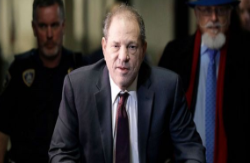Harvey Weinstein’s second trial
New trial on emerging cases.

Harvey Weinstein, a former producer, is currently on trial for numerous counts of sexual assault.
November 10, 2022
Harvey Weinstein, a former Hollywood flamboyant, may face a 140-year sentence if convicted of numerous counts of sexual violence dating back to the 1970s.
Weinstein, currently 70 years old, was an American film producer, co-founder, and co chairman of Miramax films alongside his brother Bob Weinsetin.
“Pulp Fiction” 1994, “Scream” 1996, and “She’s All That” 1999 were just a few movies that prompted Weinstein’s career to soar. Backstage however, Weinstein had been accused of attacking actresses by forcing them into uncomfortable situations.
In 2017, when the sexual harassment and assault alligations emerged to the public, Weinsten was fired and expelled from the Academy of Motion Picture Arts and Sciences.
On Oct. 5, 2017, The New York Times journalists Jodi Kantor and Megan Twohey published a story detailing the allegations, settlements to silence the victims, and shared the stories of those who came forward.
This story was a catalyst of the #MeToo movement, and it helped ignite a movement for the victims of abuse and sexual misconduct against Weinstein.
For years, investigative reports such as Kantor and Twohey had been trying to report Weinstein’s treatment of women in Hollywood. However, with the normality of transactional sex in the enterinment indutry and Weinstein’s powerful title, many officals noted that it would be difficult for these journalist to be taken seriously.
Nevertheless, Kantor and Twohey conducted confidential interviews with notable actresses, former employees, and other sources who had knowledge of Weinstein’s abuse.
While Kantor and Twohey uncovered the mistreatment of victims, Weinstein employed high profile lawyers, investigators, and other officials to prevent this story from being released.
As previously mentioned, this story enacted a movement, and within days of the story being published, victims from all over the world came forward with their own stories.
After an investigation launched by authorities in New York, on May 25, 2018 Weinstein had turned himself in to the police for the sexual misconduct allegations.
Weinstein was later charged with first- and third- degree rape, and several other crimes involving two different women a month following his trial in January 2020, and was sentenced to 23 years in prision. However, the New York State Court granted him permission to appeal the 2020 convictions.
The current trial in Los Angeles is counting for 11 additional sexual assault allegations, including rape, forced oral copulation, sexual battery, and forceful sexual pentration from 2004 to 2013; all of which Weinstein pleaded not guilty.
On Oct. 10, the jury was selected after two weeks of a selection process, made up of nine men and three women.
Of those three women, one stated she was “on the fence” about the #MeToo movement according to WSAZ3. Additional comments from the jury have suggested that they are willing to believe the victims, but not all, and another telling Weinstein’s attorneys that they have respect for both sides and they don’t care if others learned they didn’t come to a guilty verdict.
Upon being questioned on DNA evidence, one juror expressed that he would find it difficult to come to a guilty verdict with no DNA evidence. In this case in particular, there is no DNA evidence.
Alas, both the defense and prosecution will be focusing on integrating the alleged victims on the interactions with Weinstein after they had been assaulted.
The opening statements for this case began on Oct. 24, with the prosecution suggesting that the women accusing Weinstin of sexual misconduct were invalid because the actresses were using Weinstein to build their career.
The prosecution called 15 women to testify, however they were left with four after the judge excluded a majority of their witnesses and “Miss I” changed her mind and didn’t want to testify.
Beyond the witnesses the prosecution and defense are calling to testify, the jury has also heard from peers of the accusers who had been confided in.
Of the few prosecution witnesses, the jury was informed that the victims will tell a similar story of the young aspiring actresses who had been manipulated and taken advantage of by one of the most powerful men in Hollywood. Deputy District Attorney and Prosecutor, Paul Thompson, also included that “each of these women came forward independent of each other, and none of them knew one another,” but were taken under by Weinstein mentioning many A-list stars whose careers soared after being involved with him.
Thompson informed the jury that a doctor who works with sexual assault victims would inform them of the misconceptions regarding people’s behavior after being raped, explain that in most cases the assaulter is someone the victim knows, and clarify that victims sometimes will continue to communicate with their attacker.
On the other side, Defense attorney Mark Werksman argued that the victims were liars and were either making up the assaults or they had “transactional sex” with Weinstein, even stating “You’ll learn that in Hollywood, sex was a commodity,” before the jury.
Werksman even referred to Siebel Newsom as “just another bimbo who slept with Harvey Weinstein to get ahead in Hollywood,” and brought up how Newsom contacted Weinstein in 2007 asking for advice about a “bad press situation.”
Since 2017, roughly 100 women have publicly accused Weinsetin of sexual violence and innaporate behavior, but Weinsetin’s attornies insisted that these victims were “playing the damsel in distress” and the #MeToo movement is like a movie that turned Weinstin into the “bad guy.”


